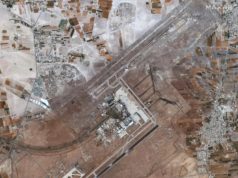Barack Obama has been given the gift of the Syrian uprising but he apparently does not want to open it. One would think his foreign policy in the Middle East would have been adaptable to the recent “Arab Spring” in the region—that once the uprisings in Tunisia, Egypt, and Libya happened, it would be possible to envision the same happening in Syria and have a policy waiting to implement. But to say this administration’s response to the Syrian uprising has been sluggish would be an understatement.
President Obama came to office with a specific goal in mind for Syria. The goal was to flip Syria out of Iran’s orbit. The means he chose to bring this strategic reorientation about was through diplomatic engagement. In order to make the Asad regime an offer enticing enough, he was prepared to pressure Israel into a peace agreement that would see the return of the Golan Heights. He would also have to recognize that Syria was the key to regional peace and come to grips with the Asad regime’s sense of importance.
Of course, Syria’s strategic reorientation through diplomatic engagement was always a pipe dream—it was never going to happen. But the White House committed to this policy despite the increasing intransigence from Damascus. And to that end, he returned an ambassador to Damascus in a recent recess appointment, despite Congressional misgivings.
 But then the “Arab Spring” reached Syria in March. And the White House and State Department clung to the mistaken belief that Bashar al-Asad was a reformer. The ridiculous question became: Maybe he would make the necessary reforms his people are demanding and remain in power? It never occurred to them that Asad would be giving up power by doing so. The necessary reforms would mean his minority lead regime would collapse in any kind of free election.
But then the “Arab Spring” reached Syria in March. And the White House and State Department clung to the mistaken belief that Bashar al-Asad was a reformer. The ridiculous question became: Maybe he would make the necessary reforms his people are demanding and remain in power? It never occurred to them that Asad would be giving up power by doing so. The necessary reforms would mean his minority lead regime would collapse in any kind of free election.
Bashar al-Asad has thrown his full weight behind crushing the uprising with tanks and guns. He is all in. The White House hasn’t even stated that he is no longer the legitimate leader of Syria—a policy statement that was far more easily spoken in the case of Egypt and Libya. And yet Barack Obama has not yet opened the gift on his lap that is staring up at him. It is the Syrian uprising itself. In fact, his goal of bringing about a strategic change in Syrian behavior is within reach and at a minimal price. It is practically a given if the White House were to back the people in the streets, call for the downfall of the Asad regime, and enlist the assistance of the European countries who were eager for bold measures in Libya.
Elliott Abrams expands on what could be keeping the White House for changing course on Syria in his blog, “Can Anyone Explain Our Syria Policy?” He lays out seven theories and makes the case that, “whatever the basis for U.S. policy, it is failing and must be abandoned in favor of a far more assertive opposition to the vicious Asad regime and a far more energetic defense of the Syrians now struggling, and dying, to end a regime that has brought decades of repression, violence and terror.”
So the question becomes: If the current policy isn’t working, but the overall goal remains prying Syria out of Iran’s orbit, how long will it take for President Obama to open the gift that the Syrian Spring provides and do something so clearly in America’s interest?





